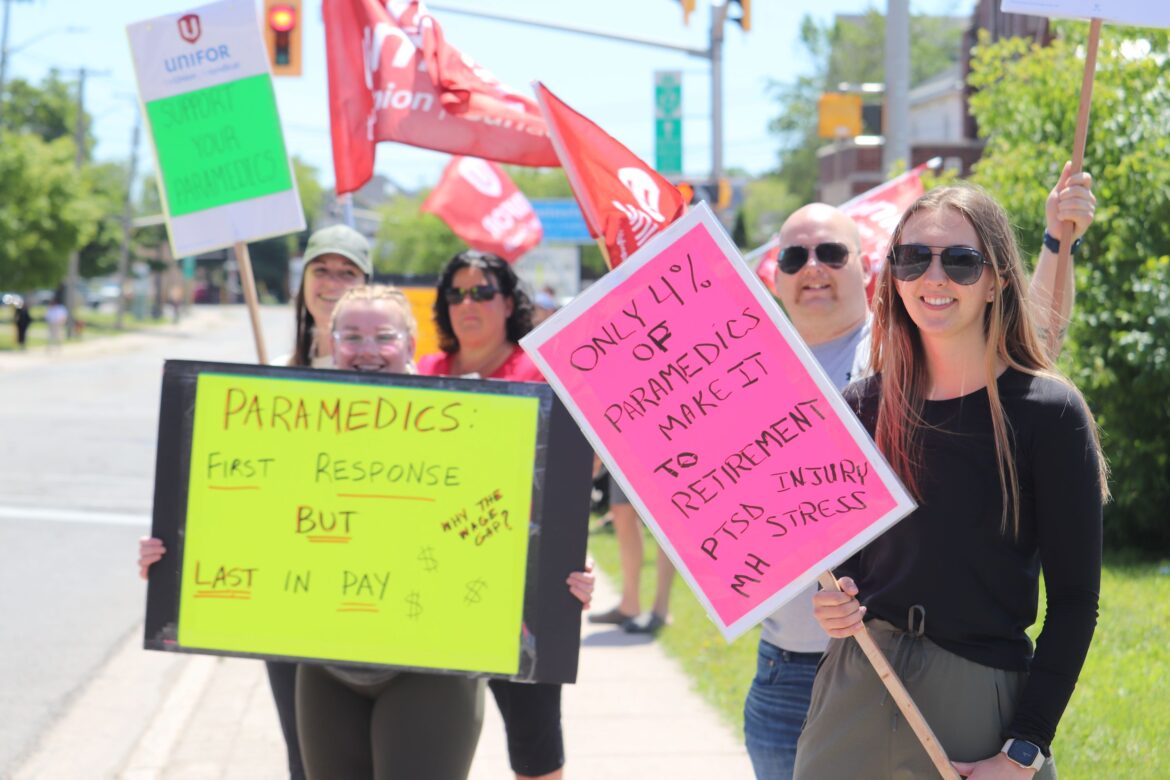For the second time in three weeks, members of Unifor Local 1359 held a public rally in Sault Ste. Marie to express their frustration over a lack of progress on a new contract for local paramedics.
While the May 21 information picket took place at an intersection near Sault Area Hospital, Tuesday’s rally brought paramedics directly to the door of their employers, the District of Sault Ste. Marie Social Services Administration Board (DSSMSSAB).
Tuesday’s downtown gathering, right outside DSSMSSAB headquarters at 548 Albert Street E., attracted dozens of participants and featured a lot of the same sights and sounds that were on display last month, including signs that read “Negotiate Not Arbitrate!”
This is a reference to the union’s rejection of the employer’s efforts to finalize a new collective agreement using an arbitrator.
“The proper channels are that the employer and the union sit at the table to renegotiate,” Unifor Local 1359 vice-president Mary Casola told The Sault Star during Tuesday’s rally.
“Our paramedics want a fair collective agreement, and we can’t do that when they’re hiding behind a desk and refusing to set dates for the next bargaining.”
Algoma-Manitoulin MPP Michael Mantha concurred with these sentiments on Tuesday, having attended the downtown rally to lend local paramedics his support.
“It’s never good when something is imposed,” Mantha said. “It generates bad feelings. It generates winners and losers. A negotiated deal is always the best deal.”
Sault paramedics are working under a contract that expired in April 2023. Unifor Local 1359 and DSSMSSAB have been attempting to hammer out a new deal since Jan. 16, according to a Monday news release from the union.
However, Casola said talks between the two parties have been on hold for nearly a month.
“I don’t think they take us seriously,” she said during Tuesday’s rally. “They left the table on May 16 with no date in the future.”
Following Tuesday’s rally, DSSMSSAB CEO Mike Nadeau told The Star via email that his organization has met with the union for 11 total days of collective bargaining, three of which included a conciliator.
Nadeau also stated that DSSMSSAB values the important work of its paramedics and remains committed to “reaching an agreement in a responsible manner that is fair to employees, municipal levy partners and the community.”
“The DSSMSSAB is committed to working through the process to reaching an acceptable agreement and has also offered to proceed to binding arbitration in an attempt to reach a resolution,” Nadeau wrote.
Just like with the May 21 gathering, Unifor Local 1359 members used Tuesday’s rally to highlight several other issues that are plaguing Sault paramedics.
These gripes include a pay gap that exists between local paramedics and other first responders, such as police and firefighters.
One rally attendee highlighted this disparity by holding a sign that spelled out the average hourly rate for a first-class Sault paramedic ($40.89), comparing that pay to an equivalent position in the local police department ($53.73) and fire service ($50.04).
Casola said this ongoing wage disparity is having a significant impact on their ability to recruit and retain staff.
“A lot of paramedics use us as stepping stones. They will work for us for a couple years and go on to fire or work with us and go on to police,” she said during an interview last month.
“We’ve had four people leave, one left for med school to become a doctor and three left to be (registered nurses), and that was all within the last five years.”
Unifor Local 1359 represents 89 paramedics who respond to around 20,000 calls per year in the Sault area by the union’s count.
According to Casola, this high call volume is making burnout and turnover even worse, which is why ironing out an improved collective agreement soon is so important.
While the union’s previous attempt to go on strike in 2018 didn’t come to fruition, Casola said they aren’t counting out the possibility of taking this kind of job action if contract negotiations continue to deteriorate.
“We don’t want to do that to the community nor to the paramedics,” she said.
“But they are very adamant that they will do it to make the position to the public, and to the employer, that they’re experiencing high call volumes and they need to be appreciated.”
By Kyle Darbyson, Local Journalism Initiative Reporter






